The Guifron Flock (established 1942)

How our import started
It all really started in 1995, when we visited the Royal Agricultural Show in England. It was there, at the Clun Forest sheep show ring, that we first met Mr. Tom Francis, who appeared to be the owner of the well-known Guifron Flock at Guifron Farm. He invited us to see his farm, and we were naturally delighted to accept his invitation to visit the Guifron Flock there.
Guifron Farm is situated on the border between England and Wales, in the hills about eight miles west of the beautiful market town of Clun. We were very impressed with his Clun Forest sheep, and in particular with a group of eighteen yearling rams, which had been kept ready for the annual Clun Forest ram sale in Ludlow. The idea then came to mind to try and import some sheep from this flock ourselves.
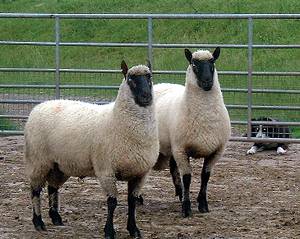
That was 1995, but it was not before 2000 that we decided to take the plunge and actually import some sheep from the U.K. Prior to that, we had always feared that the undertaking would be too complex and therefore not feasible. It was also evident in 2000 that there was an increasing need for new bloodlines in our country and we had more time on our hands anyway.
We discussed our wish to import Clun Forest sheep with Frank Gwilliam and Ralph Fulton, two English judges of the Annual Clun Forest Show in our country. They both said that they believed that Guifron is currently the most consistent and uniform Clun Forest flock in the UK. So it was, in July 2000, that we agreed with Mr. Francis to meet him in England.
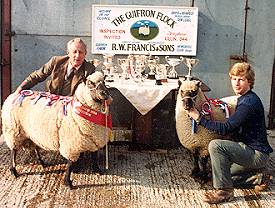
Our sheep are from excellent blood lines
We agreed to buy eight yearling ewes and one ram lamb. Of the eight ewes, four were bought for two colleague Clun Forest breeders (Ton van der Toorn and Jan Wever) in our country, so we ourselves have kept four ewes and the ram lamb. They include the Champion female and the number two of the Royal Welsh Show 2000. All eight ewes had been bred with an excellent Clun Forest ram, the Guifron FAF 97.25, which has won many prices at several shows and even became Interbreed Champion at the 1998 shows in Kington and Burwarton in the U.K.
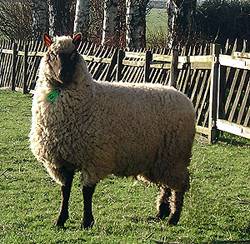
All the red tape, such as the paperwork, veterinary inspection, health certificates, transportation requirements etc. was quite a challenge, but our new Cluns arrived safely at Rotterdam on 7th December 2000. The sheep survived the lengthy trip quite well, and they appear to have adapted very well to the “Green Heart of Holland” after having been accustomed to the Shropshire hills.
The Shropshire hills and the Clun Forest area
The south-west corner of Shropshire, once part of the vast Clun Forest, is designated an area of outstanding natural beauty and is a conservationist’s paradise. The hills are softer than their rugged Welsh counterparts but the weather can often be as fierce in this corner of England as in the more mountainous regions across the border. The steep hills make it unsuitable land for arable farming on any large scale, so careful choice of livestock is essential and the land is, without doubt, good sheep country
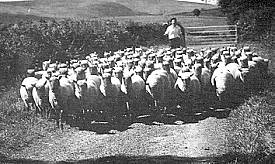
The establishment of the Guifron Flock
In 1952, at the age of 26, Mr. Tom Francis returned to this area, only a stone’s throw from his birthplace, and thus was faced with the problem of finding suitable sheep stock. The first decision he had to make was a choice of sheep that would be well suited to the type of land, with hardiness and adaptability being top of the list. There were, at that time, several breeds that seemed to meet his requirements; the Kerry Hill and the Welsh being fairly popular in the region, and of course the Cluns. At that time his father had a small flock of these black-faced ewes that he had established in 1942 and after careful deliberation Tom Francis decided to take them over. So these animals came to his farm, the forerunners of the present Guifron flock
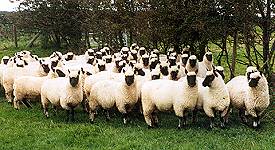
The qualities of the Guifron flock
In 2000, his flock at present consisted of about 400 sheep, and over 600 lambs. Since 1952, the quality of the Guifron flock has been developed by systematic and consistent selection of yearling ewes for replacement on the basis of their performance, conformation, strength and durability
So, at an altitude of 450 meters above sea level, what are the factors that according to Tom Francis commend the Cluns to this existence? Hardiness comes top of the list, with their excellent foraging ability and resistance to disease coming a close second. Winter can be long and bitter in these hills. Often with spring knocking at the door, winter is still covering the ground with drifts of frozen snow and lambing is often accompanied by blizzards and bitter frost. In such conditions they always bring the ewes to sheltered ground, but even without such care, the survival rate is high. With lambing at approximately 180% this low mortality rate is surprising and this must be partly due to the excellent maternal instinct and superior milking qualities of the ewes.
Another positive feature of the Cluns is their contented and docile nature. Whether it is a case of moving them for grazing, or the more confined tasks of dipping and drenching, or maybe the shearing of their dense, high-quality fleeces, they are still relatively easy to handle.
The Guifron Flock: winner of many prizes
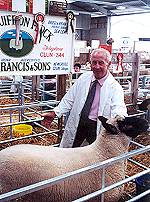
For many years, Mr. Francis has regularly entered the various sheep competitions in England and Wales. These competitions have brought the Guifron Farm many prizes and trophies. To name one example, in 1999 Guifron Farm was announced the winner of the annual Champion Clun Forest flock competition (in addition to quite a few other prizes)
After so many years in Clun Forest breeding, Tom Francis can safely say that he has proven the value of the Clun!
Note: a part of the above text is taken from the article “Cluns in their Native County”. This was published in the official publication of the Clun Forest Sheep Breeders Society Ltd.
Except for our own photographs of the two rams and the imported ewe, all photographs were from the collection of the Guifron Farm.
